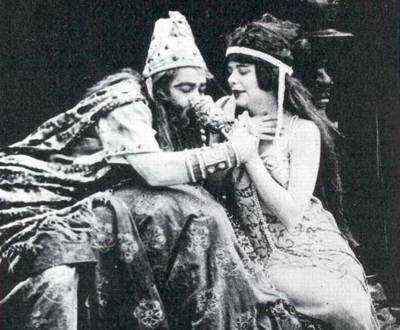
Since it is Easter time, Herr Graf's curiosity about strange Christians' pious habits led to a decision to watch a film inspired lightly by or based on religious scenes ( although aristocrats don’t share any Christian feelings about their fellow men at this time or any other time of the year ). For this reason “Judith Of Bethulia” was chosen, a film located in Bethulia, a village near Jerusalem, so it was perfect penance for this German aristocrat.
“Judith Of Bethulia” was the last film directed by Herr D.W. Griffith for “Biograph Studios” because the American director had a strange idea about how many reels were necessary to depict a story, an opinion about film running time that the company didn’t share ( afterwards Herr Griffith would take revenge and put his theory in practice in his well-known and longer silent films ). The film is the story of Damen Judith, a widower who, in order to save her city from the Assyrian invaders and the thirst and famine that her countrymen suffer in the besieged city, sacrifices her virtue to Herr Holofernes, the invading leader.
“Judith Of Bethulia” is a film in which the techniques are recognizable which made the American director famous in the silent world, even though this film exposes them in a subtle way: not forgetting the pace, the perfectly entwined shots and situations, the strong male characters that Herr Griffith was so fond of, and the fragile and self-sacrificing little fräuleins so characteristic of his cinema. This film is not remarkable but perfect ( clean, even antiseptic ) in its technical, formal and performing aspects.
And now, if you'll allow me, I must temporarily take my leave because this German Count must sacrifice himself to one of his devoted fat German heiresses
Herr Graf Ferdinand Von Galitzien
-/-
Como es tiempo de Pascua, al sentir éste Herr Graf cierta curiosidad hacia esos extraños y píos hábitos cristianos, decidióse entonces ver un filme inspirado o basado levemente en dichos acontecimientos ( aunque los aristócratas no comparten ningún sentimiento cristiano con sus prójimos en este época o durante el resto del año ), y por esa razón se eligió el filme “Judith de Bethulia”, una película ambientada en Bethulia, un pueblecito cerca de Jerusalén, por lo que, entonces, la penitencia germánica era perfecta.
“Judith Of Bethulia” fue el último filme dirigido por Herr D. W. Griffith para los “Biograph Studios” pues el director americano tenía una peculiar idea acerca de cuantas bobinas eran necesarias para contar una historia, una opinión que la compañía no compartía ( posteriormente Herr Griffith tomaría su venganza y pondría en práctica dichas teorías en sus filmes silentes más conocidos y más largos ); en el filme se narra la historia de Damen Judith, una viuda que para salvar a su ciudad de los invasores asirios además de la hambruna y la sed que sus compatriotas sufren en la ciudad asediada, sacrificará su virtud a Herr Holofernes, el líder de los invasores.
“Judith Of Bethulia” es un filme en el cual las técnicas cinematográficas por las cuales el director americano fue conocido en el mundo silente, son fácilmente reconocibles, aunque en esta obra están expuesta de una forma discreta, sin olvidar el ritmo, los planos perfectamente entrelazados y sus escenarios, los personajes masculinos poderosos que tanto gustaba Herr Griffith o las frágiles y sacrificantes pequeñas fräuleins también tan características de su cine; no se trata de una obra destacada en su filmografía ( demasiado limpia, incluso aséptica ) aunque perfecta en sus aspectos cinematográficos técnicos y formales.
Y ahora si me lo permiten les tengo que dejar momentáneamente, pues este Conde germánico tiene que sacrificarse ante una de sus devotas herederas germánicas.
Herr Graf Ferdinand Von Galitzien

Keine Kommentare:
Kommentar veröffentlichen